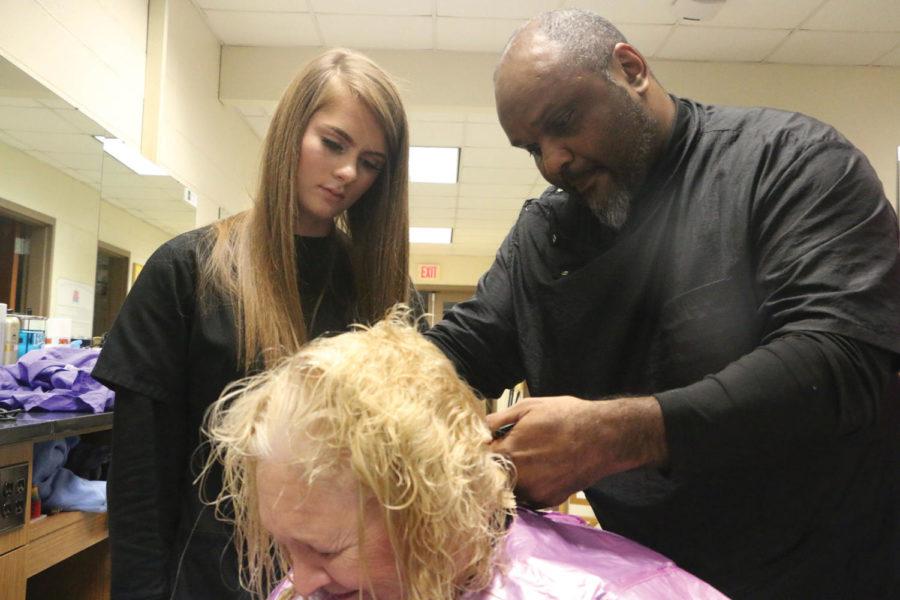Your donation will support the student journalists of Carmel High School - IN. Your contribution will allow us to purchase equipment and cover our annual website hosting costs.
Making the Cut: As students schedule for next year, classes at J. Everett Light prepare them for professional careers
January 25, 2018
On the campus of North Central High School in Indianapolis lies the J. Everett Light Career Center. In the cosmetology department, music plays as student cut, color and style hair. Senior Windle Fray chats with her client as she cuts, blow dries and straightens the light-blonde locks of her client. The two laugh as they talk about the client’s grandchildren going through the stage of the “Terrible Twos.” If this conversation took place outside of the salon, you would think these two had known each other for months.
Fray, who spends four hours a day at J. Everett Light, said hairdressing has been a longtime passion for her. As the end of the school year approaches, most CHS seniors will graduate with a high school diploma. Fray, however, said she will also obtain her cosmetology license, which she’s been working toward for a while. Learning from YouTube and imitating pictures she saw, Fray said she found a love for bohemian-influenced hairstyles.
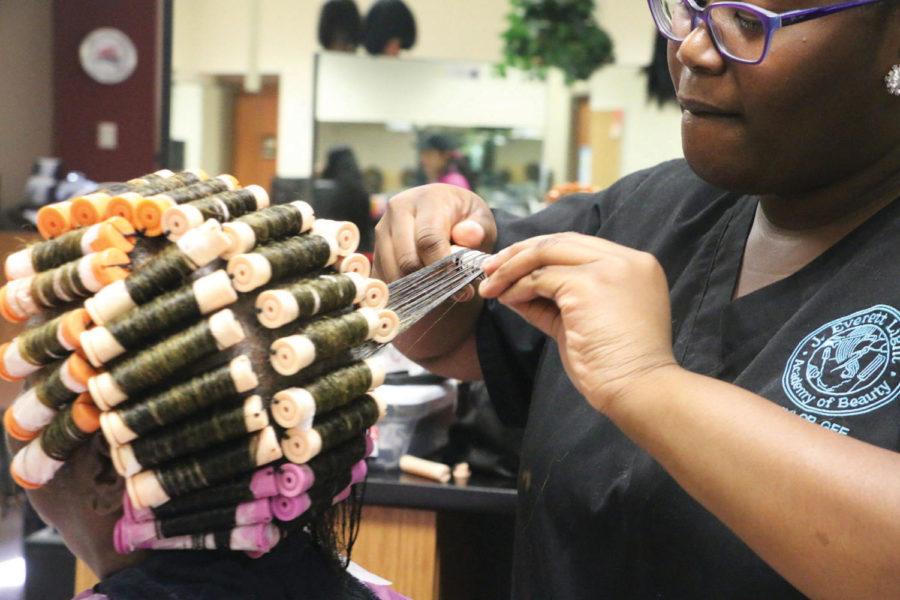
A North Central High School student places curlers in a client’s hair at the J. Everett Light Career Center. Cosmetology instructor Chris Wilcox said his students learn all the skills necessary to obtain their licenses and move directly into the professional world when
they graduate.
“I always loved doing special occasion hair and Homecoming and different things like that,” she said.
Although primarily self-taught, Fray said she has learned about different cuts and colors for hair at J. Everett Light. The standards taught at J. Everett Light are set by the Indiana Board of Cosmetology and are specifically designed to prepare students for the real world, according to Chris Wilcox, J. Everett Light cosmetology instructor.
“(Students) actually learn the basics of over six chemicals (as well as) razor cuts, scissor cuts, colors thesis, anatomy (and) chemistry,” he said. “They actually learn all of this to be able to fit into the corporate world.”
Despite the educational resources provided at J. Everett Light, the pursuit of cosmetology, sometimes without obtaining a bachelor’s degree, may still seem unorthodox, risky or “not worth it.”
However, according to school board president Layla Spanenberg, the concept of taking traditional courses in high school before graduating and attending college afterwards is not a cookie-cutter mold every student fits into.
“There are so many different pathways, and as a board we recognize there isn’t a perfect fit for every student,” she said. “It’s very important that we provide lots of opportunities because the traditional four-year college (and) going to grad school type of program is not the best fit for every student.”
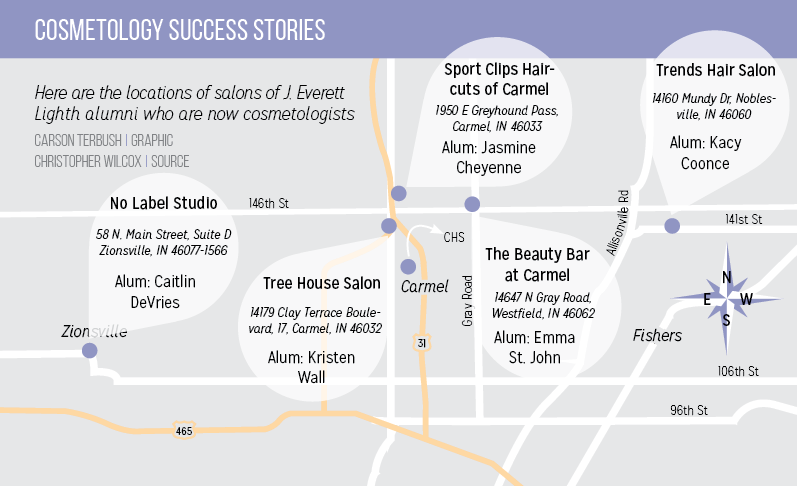
According to Spanenberg, the close partnership between CHS and J. Everett Light, which makes courses like the cosmetology program Fray attends available to CHS students, is part of the district’s growing endeavor to support students who wish to pursue technical careers. She said besides the partnership with J. Everett Light, CHS also offers work-study programs and classes with Ivy Tech. According to counselor Rachel Cole, the two tracks CHS will offer are construction trades and automotives. Cole also said it’s possible CHS will expand its partnership with Ivy Tech in the future.
Amy Dudley, Assistant Superintendent of Curriculum and current co-interim superintendent, said technical career education as well as internships and job shadowing opportunities at the high school help students become inventors and creators.
“Sometimes you’ll think, ‘Why am I learning this? What impact will this have on me?’ I think (it’s) important to connect that, to have that relevancy so students can see,” Dudley said. “It would definitely give them the benefit of seeing what interests they might have and interests they never even thought of. Really, as you think about it, our world is changing so quickly. How can we recreate ourselves? How are we continuously learning and recreating? I think this could help our kids see other possibilities.”
In fact, learning about a trade in high school provides a head start into the profession. According to Spanenberg, students can earn official industry certifications while still enrolled in high school. With the cosmetology program at J. Everett Light, students can even earn an associate’s degree.
Additionally, according to the Indiana Department of Education, 66.6 percent of Indiana high school students were enrolled in one Career and Technical Education (CTE) course, with enrollment increasing by 35 percent in the last five years and having a graduation rate 6 percent higher than Indiana’s overall 88.6 percent graduation rate.

Senior Windle Fray cuts a client’s hair at the J. Everett Light Career Center. Fray said she is cutting at an angle to create a unique bob silhouette, a technique she learned at the cosmetology program and hopes to use in her professional career after
high school.
A factor that may contribute to the success rate of CTE programs is the information taught in such courses. Although J. Everett Light’s cosmetology program provides hands-on experience, the program goes beyond just the cutting and coloring, according to Wilcox. The goal of J. Everett Light’s cosmetology program is to prepare students to jump straight into cosmetology once they graduate, Wilcox said, so the program also covers information from a business standpoint.
“(We) teach them everything,” Wilcox said. “We have (an instructor) who teaches the basics and when they come to my floor, I teach them about business. Everything that’s in the corporate world, I teach them about. They will leave (knowing) how to do everything. Hair extensions is the number one money maker (and) wig-making is another big thing that has taken over.”
Wilcox instructs the hands-on portion of the cosmetology course—the “practical,” as he calls it—where students have the opportunity to practice techniques on clients. According to Wilcox, this is both a valuable experience and a form of community service: the cosmetology students complete makeovers for domestic violence victims from the Indianapolis-based Julian Center shelter and for North Central students who can’t afford haircuts.
Furthermore, Wilcox said some of his students this year are considered “icons:” future stylists who are in a sense “scouted” by companies like J.C. Penney and Great Clips, the same way high school athletes are scouted by colleges. Except, in this case, these cosmetology students will move directly into the professional world.
“They really do the job just as well as professionals do,” Wilcox said. “I have that much confidence in them.”
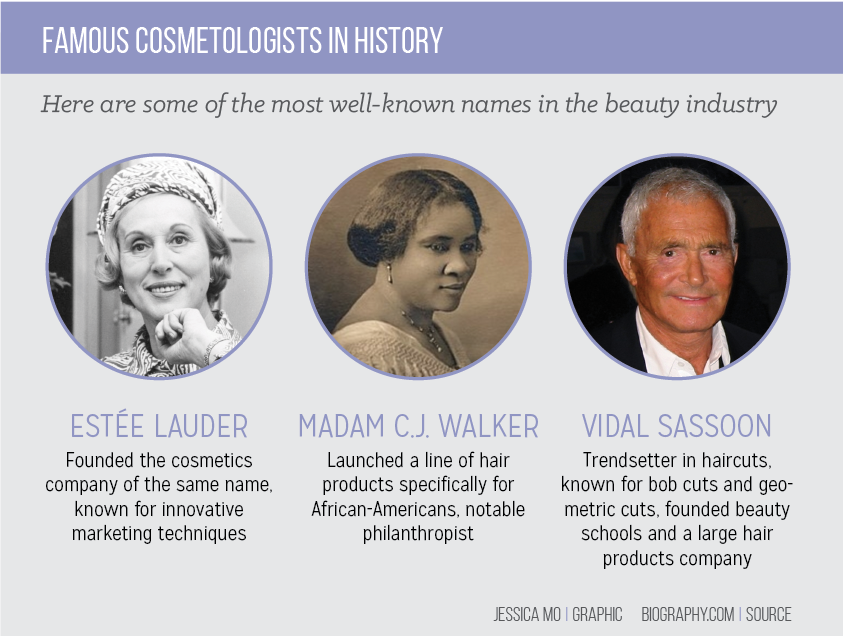
However, the pursuit of cosmetology does not necessarily always end with a CTE course or a direct job offer. Fray, who already had a taste of the business side of cosmetology through her job at Method Salon, said after she graduates with her license in May, she plans to add to the cosmetology education she has already received from J. Everett Light by attending Purdue University and studying retail management.
“I kind of want to be an independent business, so I’m trying to get that kind of business background after receiving my license, so it’s kind of the best of both worlds,” she said. Her long-term goal is to move to Nashville to do wedding hair and makeup.
Fray is not alone in this plan. In fact, according to Wilcox, other students who have graduated from the career center’s cosmetology course now have salons in Carmel and Fishers.
“One thing a lot of people say that I disagree (with) is that they do not make money in cosmetology. I totally disagree. I have friends who are stylists around the country who have their own chemical lines out. They’re making six, seven, eight digits, but they’re humble in what they do,” Wilcox said.
Although she does plan to attend a four-year college, Fray said she acknowledges the benefits attached to being able to pursue cosmetology through J. Everett Light. With earning hands-on experience, graduating high school with a cosmetology degree, and having job recruiters visiting the facility, Fray said she feels one step ahead already. Additionally, according to Wilcox, the program at J. Everett Light costs $550 while in comparison, some traditional beauty schools can cost around $20,000.
“Going to J. Everett Light has been a really good opportunity because I’ve been one step ahead, so (by) going to college I’m not set back a year or two,” she said. “(Since the program) is paid for by the school, my parents are really supportive.”
However, despite both the technical and financial benefits of cosmetology, Fray said the main reason she enjoys and is pursuing hairdressing professionally is her enthusiasm for the craft.
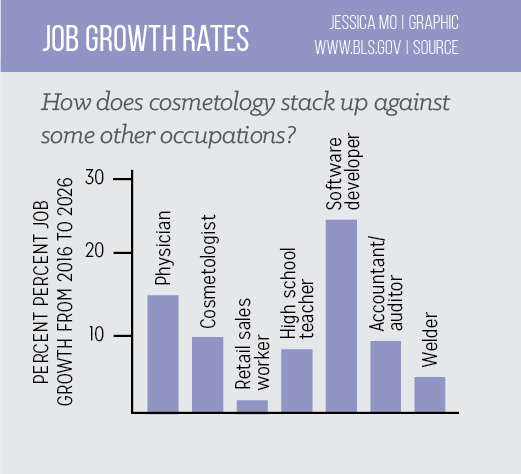
“It’s a great career and it’s really great money whether you want to do it on the side or you can pursue it fully,” Fray said. “What’s really nice about hairdressing and cosmetology in general (is that) it’s an artistic thing. People don’t realize that it’s art, but I like seeing people’s reactions. Just to see the change in their self-confidence and the change in how they carry themselves (is) really cool. It’s a different way to express yourself and portray yourself.”
Wilcox said much of the same. Working at J. Everett Light since 2004, Wilcox said he still has students from his first year who stay in touch with him and inform him of their progress. According to Wilcox, these students are still as motivated and dedicated to the craft as they were in his class.
“There’s some people who go to school and don’t love what they do. Who can get up every morning and come to a job that you can have the best time with?” Wilcox said. “(My students) come here and they’re fired up. They’re ready to lead and when it’s time for them to graduate, there’s a lot of tears, and that’s because it becomes a love between your teacher and the student and you have to cut the cord to say goodbye. I’m very proud. It’s not a job to me; it’s a lifestyle.”
